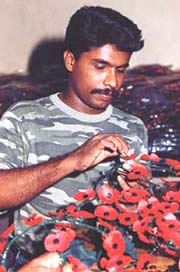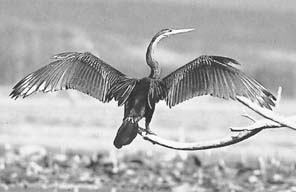



![]()
Hello Children,
Did you know that Poppy day falls on 11th of November? Most of you must be knowing that Poppy day is a day dedicated for remembering the soldiers who have bravely given up their lives for the sake of their country. Even in Sri Lanka we have many soldiers who do their best for our country, giving up so much and because of them we can live safely. So how about buying some Poppyies to help them and giving a thought to these courageous soldiers.
Watch out for the Wijeya winners which will be published next week.
Until next week,
Aunty Sunshine
I live in Kotahena. My house is small. It has a small garden where my father has grown a lot of plants. There are flowers of beautiful colours. But there is one tree which is very different. It is the toothpaste Tree.
Empty toothpaste tubes are hung on this tree and from a distance it shines brightly when it turns in the sunlight. Many of my friends and neighbours come to see this very rare tree and I am so proud of it as the tubes keep increasing every month.
Asma Aniff
Good Shephered Convent
Kotahena, Colombo -13.
My name is Dilshani Sucharitha. I am twelve years old and I am a pupil at Wickramashila Central College. I am in year seven. My class teacher is Mrs. Himali Mahaliyana. I study eight subjects and my favourite subjects are Maths, Music and English. My friends are Jeewani and Inoka.
My father is a farmer. His name is Mr. Pieris Singho. My mother is a housewife. Her name is Mrs. Karunawathi. I have two brothers and two sisters. My eyes and hair are black, and my birthday is on the 16th of August. My hobbies are reading books and telling jokes. I want to be an English teacher one day.
D. M. Dilshani Sucharitha Prabodhani
Wickramashila Central College, Giriulla.
I like to visit
The moon someday
to be the first
From Sri Lanka
But I just don't know
When I'll be able to
To visit huge Jupiter
to see the red spot
with my naked eyes
I'll be able someday
I'll wait
Till I can
To visit Venus
the twin sister
Of our earth
To see the
Earth from there
Someday...
Someday I'll be
In outer space
Looking,
At mother earth
crying happy tears
Because I've visited
Outer space.
Nisha Dassanayake
Sujatha Vidyalaya
Nugegoda.
As the bullet pierced
Their tears were washed away
They heard the final breath as they fell
with empty promises of 'peace'
thousands of people
had been killed,
Soldiers went on with their military struggle,
Another thousand refugees
left in extreme poverty, doctors, engineers, teachers,
Go on with the struggle
to serve the people better
Hundreds of women
waiting all through the night crying
sick children in their arms,
I saw a mother carrying her baby
whose face had been half blown away
I saw each and everywhere
those haunting scenes
I saw people who had lost
their arms and legs,
some waiting to die,
some in wheel chairs,
And others in crutches
Among the suffering and pain
There were gifts of food, and clothing
some were singing songs,
I saw a smile through a hidden tear
There was hope in their eyes...
Sent by: Janadari Kapugama
Mahamaya Girl's College
Kandy.

The first world war started in 1915 in the areas of Flanders, which is situated in the border of Belgium. During this war the British soldiers were led by Major General Haig in a place called Ypres. A flower grew among the carnege, it was a poppy and it remined as a symble for the fallen heroes. When these soldiers died in the battlefield there were no cemeteries to bury them. In that war zone area only the poppy flowers were left to adorn the bodies of those dead soldiers. The British thought that they will be defeated but due to General Haig's ideas and tactics they eventually won the war. When General Haig retired they put up a fund in recognition of his excellent service. The fund is named after this brave soldier as the "Haig Fund".
The poppy day falls on the 11th of November each year. The poppy day was first dedicated to the soldiers in 1921. The first poppy flowers came from France. The following year a factory was set up in London with five disabled soldiers as their employees. The contributions of the Haig Fund go to help soldiers who are casualties from the war. Sri Lanka gets poppies each year as a donation from Britain.
Sent by Chathura Wishwanath Jayaratne
Royal College
The human body is made up of bones, muscles, flesh, blood and organs. The organs of the body are eyes, ears, nose, tongue, heart, lungs, kidneys, brain, stomach and reproductive organs. Each organ has a special function (work). Each organ does its work very well. The brain is the control centre of the body and so controls the organs of the body. The brain gets food and oxygen from blood pumped from the heart. The brain thinks, makes decisions and gives orders. The brain is protected by the brain box called skull or cranium.
By M. H. Farook
Alexor International
I have lived only some years,
But I have seen death many times.
No matter who or how they die,
this heart never wanted to cry.
But when it was heard, that you've gone,
this same heart wept in wordless sorrow.
What was the difference? I really don't know why.
But I feel like I lost a best friend of mine.
I have never seen you for real in my life,
But have seen your love, that was divine.
Deep down in my heart, your picture still shines.
It will remain forever, and would never fade
The way I adored you, I kept it to myself.
That quietness made it a silent love.
But now this silent love has come out,
And makes me cry for the "princess of love"
I've heard that you always wanted to be,
the people's Queen, The Queen of their hearts.
Listen Diana, this is true what I say.
That you achieved this special part in many ways.
In thousands & millions & billions of hearts,
You're the Queen, specially in my heart.
Amali Wanasinghe.
Devi Balika M. V.
Colombo -8.
Last year our school Wildlife Society took all its members to see the Pinnawala Elephant Orphanage. It was my first trip and I enjoyed myself. A few months later during the holidays I went with my family to Bundala. Although we saw many birds I was not able to see the birds I wanted. Being a member of the wildlife society has helped me to appreciate and love nature and animals. My ambition is to become its president one day and improve our society.
Dananjaya Wijeysekera
St.Thomas College
Mt.Lavinia
Long Beaks for Catching Prey
Most of the fish-eating birds which live near lakes and rivers have webbed feet for swimming and long beaks which are ideal for catching fish or probing for molluscs.
Cormorants plunge-dive when fishing. Pelicans swim on the surface, catching fish by scooping them into their large bills.
Herons search around in shallow water near the banks, standing motionless or stalking along carefully. When the prey comes close, they stab at it with their powerful beaks. Other species, such as Ibis and egrets, use their long thin beaks to pick at the muddy river-beds, looking for worms molluscs and larvae.

Filters and "Shovel Bills"
Flamingoes feed on microscopic plants. To strain these out of the muddy water, their beaks have fine lamellae, or platelets, which act as filters.
The Whale headed Stork, on the other hand, searches in the water for frogs and fish with its large wide bill. Another group of birds, the skimmers, have a specially-shaped bill: the lower part of the bill is larger than the upper. These birds fly just above the water, catching with their bills the small fish which swim just on or just below the water-surface.
Nests
Along the sandy embankments various kingfisher species burrow tunnels up to two metres long where they nest. They feed on fish which they catch by plunge diving.
Return to Mirror Magazine contents
![]()
Please send your comments and suggestions on this web site to
info@suntimes.is.lk or to
webmaster@infolabs.is.lk